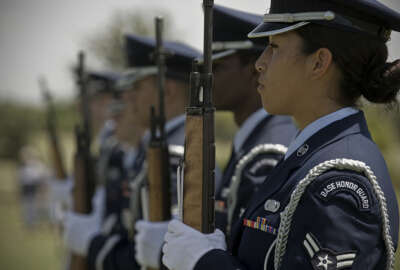Air Force weeding out policies prohibitive to women
The Air Force is taking a hard look at which of its policies are prohibitive to female airmen and likely to discourage them from serving or continuing to serve.
The Air Force is taking a hard look at which of its policies are prohibitive to female airmen and likely to discourage them from serving or continuing to serve.
Air Force Undersecretary Gina Ortiz Jones says the service created a cross functional team that is looking at gender-specific policies and the effect they have on service members.
“I was looking at packages for enlisted folks that were applying for one of our commissioning programs and one of the packages had a waiver,” Ortiz Jones said Thursday at the Women’s Air and Space Power Symposium. “This airman had to submit a waiver because she was pregnant. I thought to myself, ‘Why the heck does somebody have to submit a waiver for a commissioning program just because they’re pregnant? Right?’ It doesn’t make sense. My real concern when I see things like that is that somebody probably didn’t apply, because they didn’t want to submit a waiver.”
The Air Force and the other military services have been trying to encourage women and minorities to stay in the military and climb the ladder to higher ranks. Recent studies in diversity by the military found that white men overwhelmingly hold leadership positions.
The Pentagon sees that as a weakness.
“When you ignore any segment of the population, you run the risk of not grabbing the best talent available for critical missions. And so, in some sectors, the progress is a lot slower than others, but I do see progress overall,” Elizabeth Phu, DoD’s principal director of cyber policy, said earlier this year.
The Air Force team will sift through and quantify policies that are prohibitive to women. It’s also calling on airmen to submit their opinions on policies they see as barriers.
“Sometimes we don’t even know that there truly is an operational benefit, if it ever has been an operational benefit of these policies, but are certainly having the effect of deterring folks from raising their hand, and more importantly, preventing us from fully tapping into the full talent within the force,” Ortiz Jones said.
The team will investigate if there is any operational benefit and look into the possibility of getting rid of prohibitive policies or modifying them.
“One policy area that, I know has been frustrating for many of you and for me is a flying while pregnant policy,” Ortiz Jones said.
She added that the Air Force needs to use data-driven approaches to justify policies.
“Why exactly do we have a restriction on pregnant women flying in ejection seat aircraft? What data shows that is necessary? What data do we have?” Ortiz Jones said. “What data are we trying to get to understand the minimal amount of time that a pregnant aviator has to be out of the cockpit? That’s time which affects their competitiveness for a stratification and increases the likelihood they’ll need to attend requalification week qualification training. Let’s not kid ourselves about the very real impact these policies have on our leadership pipeline.”
The Air Force established its office of diversity and inclusion about a year ago in hopes of addressing racial and gender disparity. That office has cross functional teams and task forces of its own focusing on discipline data and emblems and mottos.
Copyright © 2025 Federal News Network. All rights reserved. This website is not intended for users located within the European Economic Area.
Scott Maucione is a defense reporter for Federal News Network and reports on human capital, workforce and the Defense Department at-large.
Follow @smaucioneWFED
Related Stories






